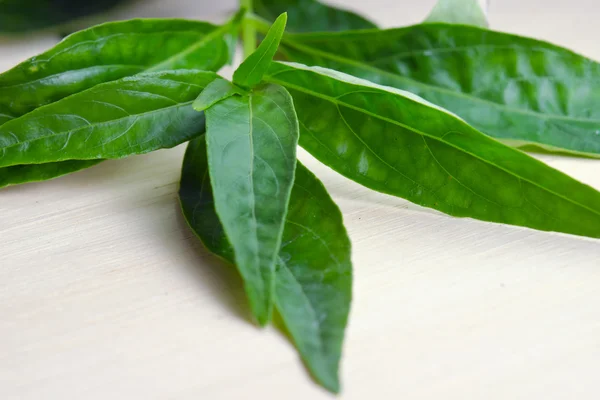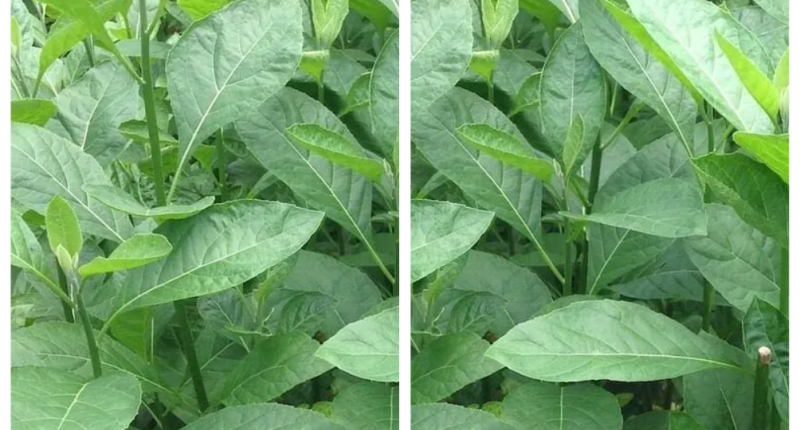Discover “35 Proven Health Benefits Of Bitter Leaf ” Bitter leaf (Vernonia amygdalina) is a small shrub belonging to the Asteraceae family, commonly found in tropical and subtropical regions of Africa. It is known for its characteristic bitter taste, which arises from the presence of various compounds like sesquiterpene lactones, flavonoids, and alkaloids.
Bitter leaf is generally considered safe for consumption in moderate amounts. However, it may interact with certain medications, so it is important to consult with a healthcare professional before consuming it if you are on any medications. Additionally, pregnant and breastfeeding women should avoid using bitter leaf due to potential risks to the fetus or baby.

While several studies have explored the potential health benefits of bitter leaf, more research is needed to fully understand its effectiveness and safety. Some studies have shown promising results, but further investigation is necessary to confirm its efficacy for various health conditions.
Medicinal Uses
Bitter leaf has been used in traditional African medicine for centuries. It is believed to have a number of medicinal properties, including:
- Anti-malarial: Bitter leaf has been shown to be effective against malaria parasites in both laboratory and animal studies.
- Antibacterial: Bitter leaf has been shown to be effective against a number of bacteria, including Staphylococcus aureus and Escherichia coli.
- Anti-inflammatory: Bitter leaf has been shown to reduce inflammation in both laboratory and animal studies.
- Antioxidant: Bitter leaf is a good source of antioxidants, which can help protect the body from damage caused by free radicals.
- Detoxifying: Bitter leaf is believed to help detoxify the body by removing toxins from the blood and liver.
- Digestive: Bitter leaf is believed to aid digestion by stimulating the production of digestive enzymes.
- Cancer: Some studies suggest that bitter leaf may have anti-cancer properties.
Nutrition
The bitter leaf, known scientifically as Vernonia amygdalina, is a shrub native to tropical Africa and Asia. While it is well known for its distinct bitter flavor, it also packs a punch when it comes to nutrition. Here’s a breakdown of the key nutrients found in bitter leaf:
Macronutrients:
- Protein: Bitter leaf is a good source of protein, with up to 20% of its dry weight being protein. This is important for building and repairing tissues, and supporting overall health.
- Fat: Bitter leaf contains a small amount of healthy fats, around 4.7% of its dry weight. These fats are essential for various bodily functions, including energy production and hormone regulation.
- Carbohydrates: Bitter leaf is a low-carbohydrate food, with about 6.6% of its dry weight being carbohydrates. These carbohydrates are mainly in the form of dietary fiber, which is important for digestive health.
Micronutrients:
- Vitamins: Bitter leaf is a rich source of vitamin A, which is important for vision, skin health, and immune function. It also contains vitamins C and E, which are antioxidants that protect cells from damage.
- Minerals: Bitter leaf is a good source of minerals such as iron, calcium, potassium, and magnesium. These minerals play important roles in various bodily functions, including bone health, muscle function, and nerve function.
- Other bioactive compounds: Bitter leaf contains various bioactive compounds, including sesquiterpene lactones, flavonoids, and saponins. These compounds are thought to contribute to the plant’s medicinal properties.
Here’s a table summarizing the nutritional value of 100 grams of fresh bitter leaf:
| Nutrient | Amount |
|---|---|
| Calories | 54 |
| Protein | 3.33 g |
| Fat | 1.01 g |
| Carbohydrates | 9.2 g |
| Fiber | 29.2 g |
| Vitamin A | 5,790 IU |
| Vitamin C | 22 mg |
| Iron | 5.14 mg |
| Calcium | 140 mg |
| Potassium | 2,230 mg |
Overall, bitter leaf is a nutritious food that can contribute to a healthy diet. It is a good source of protein, vitamins, minerals, and fiber. Additionally, the bioactive compounds found in bitter leaf may offer various health benefits.
35 Proven Health Benefits of Bitter Leaf (Based on Current Research):
General Health:
- Boosts Immunity: Rich in vitamins A, C, and E, promoting a healthy immune system.
- Promotes Detoxification: Supports the body’s natural detoxification processes.
- Improves Energy Levels: Contains vitamins and minerals essential for energy production.
- Reduces Inflammation: Possesses anti-inflammatory properties, beneficial for various conditions like arthritis and pain.
- Protects Against Oxidative Stress: Rich in antioxidants that combat free radical damage, linked to chronic diseases.
Digestive Health:
- Improves Digestion: Stimulates the production of digestive enzymes and bile, aiding digestion.
- Relieves Constipation: Promotes bowel movement and helps alleviate constipation.
- Treats Diarrhea: Exhibits antimicrobial properties that help fight diarrhea-causing pathogens.
- Reduces Stomach Ulcers: May help prevent and heal stomach ulcers.
- Promotes Gut Health: May support the growth of beneficial gut bacteria.
Blood Sugar and Heart Health:
- Regulates Blood Sugar: Improves insulin sensitivity and helps control blood sugar levels, beneficial for diabetes management.
- Reduces Cholesterol Levels: May help lower LDL (bad) cholesterol and increase HDL (good) cholesterol levels.
- Improves Blood Pressure: May help lower elevated blood pressure.
- Protects Against Cardiovascular Disease: Reduces risk factors for heart disease, such as high blood pressure and cholesterol.
- Improves Blood Flow: May enhance blood circulation throughout the body.
Reproductive Health:
- Relieves Menstrual Pain: May alleviate cramps and discomfort associated with menstruation.
- Boosts Fertility: May improve sperm motility and quality in men.
- Promotes Uterine Health: May help regulate the menstrual cycle and support uterine health.
Skin and Hair Health:
- Reduces Acne: Antibacterial properties help fight acne-causing bacteria.
- Improves Skin Health: May promote wound healing and skin regeneration.
- Reduces Wrinkles and Fine Lines: Antioxidants may protect skin from damage and aging.
- Strengthens Hair: Rich in nutrients that promote hair growth and health.
- Reduces Hair Loss: May help prevent hair loss and thinning.
Other Benefits:
- Boosts Liver Function: May protect the liver from damage and improve its function.
- Treats Malaria: Possesses antimalarial properties that may help fight malaria parasites.
- Reduces Fever: May help lower body temperature and reduce fever.
- Relieves Pain: Exhibits analgesic properties that help manage pain.
- Improves Sleep Quality: May promote relaxation and better sleep.
- Boosts Cognitive Function: May improve memory and cognitive performance.
- Reduces Anxiety and Depression: May help alleviate symptoms of anxiety and depression.
- Supports Bone Health: Rich in calcium and magnesium essential for strong bones.
- Promotes Wound Healing: Antibacterial and anti-inflammatory properties support wound healing.
- Improves Eye Health: Rich in vitamin A essential for eye health.
- Reduces Risk of Cancer: Antioxidants may help protect against cancer development.
- Boosts Energy Levels: Contains vitamins and minerals essential for energy production.
It’s important to note that ongoing research continues to explore the full potential of bitter leaf and its health benefits. While these claims have been supported by scientific studies, further research is necessary to solidify the evidence and determine the precise mechanisms of action. Additionally, individual responses may vary depending on health conditions and overall health status. Always consult your healthcare provider before incorporating bitter leaf into your diet or using it for medicinal purposes.
Culinary uses
Despite its bitter taste, bitter leaf is consumed as a vegetable in various African cuisines. It is used in soups, stews, salads, and even juices. The bitterness can be reduced by boiling the leaves or soaking them in water before cooking.
Precautions
Bitter leaf is generally considered safe for most people. However, there are a few precautions to be aware of:
- Pregnant and breastfeeding women should not consume bitter leaf, as it may induce labor or harm the baby.
- People with liver or kidney disease should consult with their doctor before consuming bitter leaf.
- Bitter leaf may interact with some medications, so it is important to talk to your doctor if you are taking any medications.
How to use Bitter Leaf
Bitter leaf can be consumed in a number of ways, including:
- Tea: The leaves can be dried and made into a tea.
- Soup: The leaves can be added to soups and stews.
- Juice: The leaves can be juiced and consumed fresh.
- Powder: The leaves can be dried and ground into a powder, which can be added to food or drinks.
- Capsules: Bitter leaf is also available in capsules.
FAQs – Bitter Leaf
What is bitter leaf?
Bitter leaf (Vernonia amygdalina) is a medicinal plant native to tropical Africa. It is a small shrub with elliptical leaves and a bitter taste.
What are the health benefits of bitter leaf?
Bitter leaf is traditionally used to treat a variety of ailments, including malaria, diabetes, fever, high blood pressure, stomach problems, and skin problems. Modern research suggests that bitter leaf may have anti-inflammatory, antioxidant, and anti-malarial properties. It may also be beneficial for blood sugar control, liver function, and digestive health.
How is bitter leaf consumed?
Bitter leaf can be eaten raw, cooked, or dried. It can also be made into a tea, juice, or powder.
Are there any side effects of consuming bitter leaf?
Bitter leaf is generally safe for most people to consume. However, it can interact with some medications and may cause side effects, such as nausea, vomiting, and diarrhea. Pregnant and breastfeeding women should avoid consuming bitter leaf.
Where can I buy bitter leaf?
Bitter leaf can be found at some African markets and specialty stores. It is also available online.
Here are some additional FAQs about bitter leaf:
- Can bitter leaf help you lose weight? There is some evidence that bitter leaf may promote weight loss by increasing satiety and reducing calorie intake. However, more research is needed.
- Is bitter leaf good for your hair? Bitter leaf contains nutrients that may be beneficial for hair health, such as vitamin A and iron. However, more research is needed.
- Can bitter leaf cure cancer? Although some studies suggest that bitter leaf may have anti-cancer properties, more research is needed to confirm this.
- How much bitter leaf should I consume? There is no recommended dosage for bitter leaf. Start with a small amount and gradually increase it as needed.
- Is bitter leaf bitter? Yes, bitter leaf is very bitter, hence its name. However, the bitterness can be reduced by cooking or making it into a tea or juice.
Scientific References:
-
- https://pubmed.ncbi.nlm.nih.gov/37842258/
- https://www.ncbi.nlm.nih.gov/pmc/articles/PMC3138040/
- Vernonia amygdalina (bitter leaf): https://www.cabi.org/Uploads/CABI/publishing/promotional-materials/insert/IS%20Compendium%20-%20A4%20Insert.pdf
- Biological and bioactive components of bitter leaf (Vernonia amygdalina leaf): Insight on health and nutritional benefits. A review: https://www.sciencedirect.com/science/article/pii/S2772753X2300309X
- Role of bitter leaf (Vernonia amygdalina) extract in prevention of renal toxicity induced by crude petroleum contaminated diets in rats: https://www.researchgate.net/publication/283212527_Toxic_effect_of_Vernonia_amygdalina_Delile_on_Blood_parame
Disclaimer:
This information is for educational purposes only and is not intended to be a substitute for professional medical advice. Always consult with a healthcare professional before consuming bitter leaf, especially if you have any underlying health conditions or are taking medications.
Note: This article is written based on scientific evidence found by the 247newsaroundtheworld.com team. Sources are duly referenced with keywords hyperlinked to source websites and are clickable for reference.
I hope this information is helpful. Please let me know if you have any other questions.







